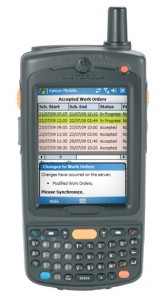Mobile ERP: Mobilising your competitive advantage in the field, factory and warehouse
By Craig Charlton, senior vice president and general manager, Asia Pacific Epicor Software
No longer something that simply offers a competitive edge, having mobility in the workforce today is a competitive necessity; particularly in certain vertical sectors such as the metalworking industry.
The vast majority of medium-sized businesses already utilise the benefits of an Enterprise Resource Planning (ERP) system to optimise and improve organisational processes and cut costs. Enter enterprise mobility, which is all about flexibility, provides easy access to information and processes to employees wherever they are located.
It can encompass everything from the integration of mobile phones into a corporate telephone system to vertically oriented solutions involving the quick delivery of productivity enhancing information to people in the field, the factory and in the warehouse.
The Internet and ubiquitous mobility play an essential part in the daily lives of the information-hungry global economy, but how do you make ERP mobile? Furthermore, how do you use mobility to the benefit of the metalworking industry and other manufacturers?
The image of the traditional ERP system doesn’t match with today’s powerful mobile devices and flexible, scalable software solutions. The traditional image has become outdated. There is a new set of technologies which enable ERP with’ Enterprise Mobility.’
‘Enterprise Mobility’ improves employee performance and increases productivity by ensuring employees access to data from your ERP system at all times and in all locations. Inventory tracking is improved by labelling and scanning inventory to achieve optimum traceability and to make immediate adjustments during counting, leading to improved confidence in your enterprise data; you know your stock levels are accurate and can therefore make better business decisions when buying and selling products.
Material handling and visibility on the plant floor is also improved. The use of mobile solutions allows an organisation to track Work In Progress (WIP) and eliminate the need to go back into large systems to search for products. A company can search through their products at the tip of their fingers and be confident that their delivery estimates will be accurate.
Businesses regard enterprise mobility as a key investment because it can help them:
* Improve service quality levels – provides mobile field representatives access to relevant functions and data so that they can deliver on-the-spot, real-time information to customers
* Operate more efficiently – allows organisations to reclaim time previously lost to travel and connectivity issues, build deeper business relationships and improve productivity
* Gain a competitive advantage Ð provides instant access to data, including pricing and inventory levels
* Extend business borders and enter new markets Ð enables an ability to transact business where it happens, regardless of location or connectivity
* Make employees more productive Ð increases the cost effectiveness of mobile technology the ability to access and work with essential information
Mobile ERP offers organisations the option for lightweight access and ability to work with information within their ERP system through un-tethered wireless Web browsers, on a variety of common mobile devices like laptops, iPads or smart phones.
With the rapid expansion of mobile devices, you should make sure that your ERP solution can handle deploying information and transactions to these devices seamlessly by using technology that allows ERP applications to run as smart clients or Web clients, or on mobile devices, all from the same source code. This will ensure that customization and user personalization remains intact, whatever the user interface.
As well as making general ERP applications available on mobile devices, some ERP vendors will have specific mobile solutions for vertical sectors like metalworking which contain departments that are very mobile-centric. Mobile solutions for these vertical sectors include:
* Handheld, MES (Manufacturing Execution Systems) which offer support for on-premise / local mobile tools such as vehicle mounted PCs, rugged shop devices, handheld inventory tools, and barcode scanners.
* Field Service solutions with modern and robust mobile technology with purpose built applications for field-based teams. Field Service provides both connected (wireless) and disconnected (local device storage) support with real-time or scheduled synchronization. Mobile field service gives field service engineers access to comprehensive role-specific functionality alongside synchronized enterprise resource planning (ERP) data. With it, users can:
* Receive and update rosters of service call jobs
* Process service call jobs, tracking labour, inventory, materials and equipment in a configurable workflow
* Specify OH&S, QA, customer approval forms using a simple graphical tool.
* Update service call status in ‘real-time’
* Operate ‘offline’ on a local SQL database when not connection to Epicor
* Manage schedule and allocation using the ‘Schedule and Dispatch’ option
Mobility in the workforce and access to company data and customer information in real-time is a competitive necessity in vertical sectors like metalworking.
 Mobile solutions can support more customers, transactions, and products, and maintain a wider range of business partner relationships. Starting with an ERP system that can seamlessly deploy information and transactions to these devices is crucial to realising the full benefits of mobility in the field, factory and warehouse.
Mobile solutions can support more customers, transactions, and products, and maintain a wider range of business partner relationships. Starting with an ERP system that can seamlessly deploy information and transactions to these devices is crucial to realising the full benefits of mobility in the field, factory and warehouse.



